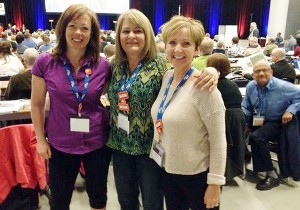Home »

Making women’s equality a reality
International Women’s Day is a time for celebration, reflection, and action.
Since the day was first observed on March 8, 1909, progress and achievements toward women’s economic, political, and social equality have undoubtedly been made – this we must celebrate. However, significant barriers still remain in almost every country, and for that we must continue to reflect and urge our governments and communities to act.
Even in wealthy countries like Canada, violence against women continues, equal pay is elusive, and women are significantly under-represented in positions of decision-making and leadership. When you look closer at the progress of aboriginal women, women with disabilities and racialized women the picture becomes even less rosy.
So when will this change? Apparently by 2030.
Women and state officials from around the world are gathering in New York this week for the United Nations Commission on the Status of Women (CSW). Assessments, discussions, and decisions will be made about how to accelerate progress toward gender equality and women’s empowerment. The Commission meets annually around International Women’s Day to discuss topics of importance to the advancement of women and girls. This year is of particular significance given the focus on the 20-year review of the Beijing Declaration and Platform for Action, a momentous agreement adopted at the fourth Women’s World Conference.
In the lead up to this session, all countries were asked to undertake an internal assessment of their progress in the 12 critical areas identified in 1995, including women’s poverty, health, economic and political participation, education, and human rights.
The results are depressing – no country has fully achieved the goals that were set. Indeed, across the board, progress has been slow and uneven, with some countries much further behind than others. The draft political statement for the session, which is expected to be adopted in the first few days of the meetings, urges countries to commit to accelerate progress, and sets a new goal of 2030 to fully realize the declaration and platform for action.
For women who remember that fourth World Women’s Conference, this delay is surely a disappointment – another 15 years would be nearly two generations since 1995. For others, 2030 may seem a very ambitious goal knowing just how far many countries are from even granting women and girls some of the most basic human rights.
There is a large contingent from Canada who attend the CSW sessions annually and actively participates in the proceedings including my organization, the Canadian Federation of University Women. As well there are representatives from the YWCA Canada, the National Council of Women Canada, and others. For those of us that attend regularly, we know that making commitments is the easiest part – it’s the implementation that’s the major challenge. So when the session ends, women/girls’ rights advocates will begin the hard work of trying to hold our respective governments to their commitments.
In Canada our outcomes are clear: a National Action Plan on Violence against Women and Girls: a National Anti-Poverty Plan with a clear gender lens; affordable early learning and child care; federal (and where none exist, provincial) pay equity legislation; gender budgeting; and decision makers who are responsive to the needs of women and girls.

Since 1982, Canadian Federation of University Women (CFUW) Cranbrook Club has been celebrating East Kootenay women through their prestigious Woman of the Year Program.
Since the inception of the club, 37 women have been titled ‘Woman of the Year.’
“We endeavour to celebrate these incredible women on International Women’s Day,” said Cathryn Henley, Chair of the CFUW Cranbrook Club Woman of the Year Committee, 2015. Leslie Molnar is Woman of the Year 2015, but unavailable for Sunday, March 8, so we are celebrating her achievements on Thursday, March 5. The ceremony will begin at 4 p.m. at the Manual Training School.
All former Woman of the Year recipients of the East Kootenay are encouraged to join Leslie, her friends, family and co-workers for this 33rd annual event.
For further information please see our website at www.cfuw-cranbrook.com.
The Cranbrook Club has 12 members locally and is a member of CFUW National, a non- political, voluntary, self-funded, bilingual and non-governmental organization of women university graduates in 110 clubs across Canada that works to improve the status of women and girls, education, peace, justice and human rights. CFUW holds special consultative status at the United Nations (ECOSOC) and belongs to the Sectoral Committee of education of the Canadian Commission for UNESCO. CFUW is the largest of 61 national affiliates of the International Federation of University Women (IFUW).
CFUW – Cranbrook Club







